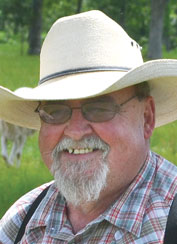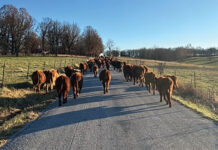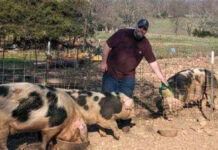
Randy and Melody Wehner of rural Dallas County, near Long Lane, Mo., will be the first to tell you they have had different breeds of sheep over the years, but without a doubt, Katahdins, which are haired sheep, are their hands-down favorites.
At the moment, they have just over 40 head and are raising them on 80 acres.
“We’ve been doing this since 2003,” Randy shared recently while calling his “girls” over to the fence. “They are a meat sheep, low maintenance and more parasite resistant than other breeds. They are gentile and you can call them right up. They are not nearly as flighty as some of the others and that just makes them easier to handle.”
That last characteristic has become exceedingly important in the last year or so for both Randy and Melody.
“We’ve had up to 100 sheep and she told me she wanted to cut back a little,” he continued with a wry smile. “I wasn’t necessarily in favor of that but then it became a necessity.”
Melody was diagnosed with breast cancer and has been in the fight of her life in recent months but in doing so, she has proved what a fighter she really is.
“We had to cut back then,” Randy added. “There are so many things you really need two people to accomplish, like trimming their feet, pulling a lamb so we didn’t really have any choice.”
Melody agreed with a smile.
“The thing I like about these sheep is there is no shearing,” she said. “We like eating the meat and always have a couple of lambs in the freezer. Not every ram lamb is ram quality but all are eating quality. We showed quite a bit in the past and that helped establish our reputation at places like the Missouri State Fair and Farm Fest. We would show breeding stock and we sell all of ours by private treaty as a result.”
Randy added that sheep are also easier on the pocket book.
“You can raise six sheep for the time and money investment you have in one cow. If I were a younger man, I’d buy 200 ewes and make a living at it. You aren’t going to earn a fortune, but you could certainly make enough to earn a living,” he said.
Randy, who is the president of the Missouri Katahdin Association, MoKats as they like to call themselves, encourages anyone who has questions to contact them and the association will put them in touch with a nearby breeder, anywhere in the state. He has been involved in other agricultural pursuits over the years, including operating a feed and tack store in Odessa, Mo., for many years and running the Urbana Sale Barn in Urbana, Mo., at one time. Melody was also a full-time registered nurse for many years.
“When we had the store, we worked with 4-H kids and we had quite a show team,” Melody said. “The Katahdins are also so easy to show, just bathe them with a little Dawn dish soap and trim their feet and you’re done. They are a lot less work in the show ring than other breeds and ours were all broke to lead, halter broke so that helped, too.”
Sheep are also prolific animals, which is another aspect Randy likes about sheep production.
“Every seven or eight months, you can breed a ewe and five months later, she’ll give you one or two babies,” he explained. “Two months later, those lambs are weaned. Twelve or 13 months later, they have a baby on their side. You can’t do that with a cow. That comes out a lot better by the time you figure your costs. You can run the sheep in place of cattle, separate from the cattle or with your cattle.”
In addition to the sheep, the Wehners have three miniature donkeys and four miniature horses, all of which help protect the sheep from coyotes and wandering dogs. There are also three older saddle horses, some poultry, Red Wattle pigs and Dexter cattle as the Wehners raise all of their own meat.
“The sheep are the only ones who pay though,” Randy laughed. “They support everything else.”







